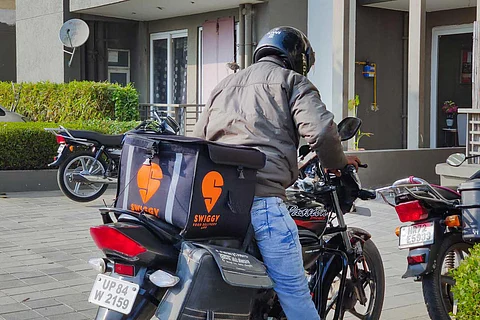

At a time when drivers and delivery agents on gig economy platforms are making their voices heard — especially delivery workers — about their work conditions, timings, abysmal pay and more, the Indian Federation of App-based Transport Workers (IFAT) has filed a public interest litigation (PIL) in the Supreme Court asking the Union government to help app-based delivery and transport persons who have been affected by the pandemic. It also asks that these workers be recognised as ‘unorganised workers’ and ensure they get the relevant rights under it, including social security benefits. Apart from the Union government, the petition names Ola, Uber India, Swiggy and Zomato as respondents.
In the PIL, IFAT makes several demands to the Union government and seeks to hold app-based companies such as Ola, Uber, Swiggy and Zomato accountable to the driver partners and delivery executives engaged with the company.
It alleged that the failure to register gig workers as unorganised workers and provide them with social security under existing law is a violation of rights under Article 21 of the Constitution of India — “the right to work, the right to livelihood; right to decent and fair conditions of work. “It is also a denial of the right to equality before law and equal protection of laws inasmuch as they are similarly situated with all other workers under the applicable social security laws including the Act of 2008 thereby violating Article 14 of the CoI,” the PIL reads.
It is important to note that drivers who drive for companies such as Ola and Uber and delivery partners of companies such as Swiggy and Zomato are not on the company payroll, and get paid per task — and hence are gig workers. Since they are not full-time employees, they do not receive the benefits that salaried employees do.
The PIL claimed that the denial of social security benefits to gig and platform workers has resulted in their “exploitation through forced labour within the meaning of Article 23 of the CoI”. Article 23 of the Constitution refers to prohibition of human trafficking and forced labour.
The PIL refers to the Unorganised Workers Social Security Act, 2008, which was enacted to provide social security and for the welfare of unorganised workers. It adds that gig workers, however, aren’t covered under the same.
The Code on Social Security, 2020, was recently brought to amend and consolidate laws relating to social security and is the first time that an attempt is being made to bring gig workers under the law and provide social security. The Code is yet to come into force.
“At present, these workers are not being provided the benefit of social security under any of the labour legislations-organised or unorganised. This defeats the very purpose of the social- welfare legislations, which seek to ensure social security to the workers,” the PIL mentions.
The IFAT PIL alleged that there has been a steep decline in average monthly income and that they did not receive support. It added that from its own survey, drivers and driver partners spend close to 16 to 20 hours in their cars each day.
“The long hours of work in fixed positions affects them physically, and also mentally. According to an IFAT survey, it has been found that about 60.7% of the surveyed persons in the 20-40 age group have claimed to have back problems. Further, it was found that 73.5% of the app-based workers did not have any health insurance,” the PIL read.
It further added that gig workers are not given a medical allowance and must personally pay any and all of their medical bills.
The PIL also said that the app-based workers are facing starvation and looking at poverty as fuel prices rise, and they have to meet EMI payments to pay off loans on their vehicles. Added to this, there are health-related issues as their working hours aren’t fixed and can run into many hours and they don’t earn enough to cover medical expenses. Even during normal times, they do not earn a fair wage and there is no transparency in the system and no cushion or security in the form of ESIC (Employees’ State Insurance) and EPF (Employees’ Provident Fund). The drivers also face harassment, and there is zero responsibility taken by the aggregator companies for any of the issues they face. Moreover, the State has also abdicated responsibility when it comes to looking out for the welfare of app-based worker according to the PIL.
The PIL seeks that gig workers be treated as unorganised workers and that specific schemes such as health insurance, disability allowance, housing allowance be formulated for them and that this is added to the UW Act. It also asks for directions to be issued to include the option of registering a gig/platform worker on the E-SHRAM portal, that aggregators deposit a percentage of their turnover for a cess to operate schemes for app-based workers, which will include government contribution. It seeks minimum health insurance, fixed working hours, grievance redressal, a minimum payment of fares, recognition as a frontline worker and more. In addition, its demands also include cash transfers of Rs 1,175 per day and Rs 675 per day until December 31, 2021, or until such time as the pandemic has completely subsided, to app-based workers.
It also asks for the distribution of foodgrains under the PM Garib Kalyan Ann Yojana to be extended to app-based workers irrespective of whether they hold ration cards, and also for vehicles not to be seized till the time the pandemic continues for those who are unable to repay EMIs.